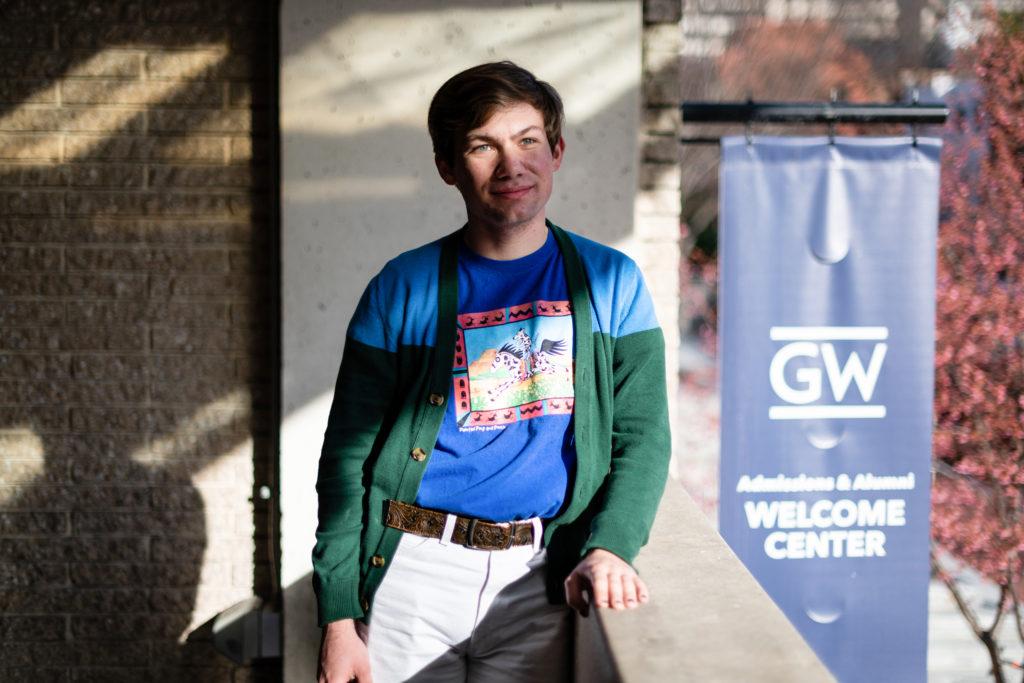A freshman and Student Association outsider is the third student to enter the race for executive vice president.
Andy Liaupsin, a member of Sunrise GW, the Progressive Student Union, Students Against Imperialism and GW for Bernie, said his background as an activist and experience engaging in “direct conflict” with administrators will make the SA a more “effective” body. He said that if elected, he would work to secure fair wages for workers, revamp GW security systems and redress flaws within University President Thomas LeBlanc’s upcoming strategic plan.
“Right now we’re at a point where we have to start dealing with the biggest, most pressing issues on our campus,” he said. “And while I’d like better WiFi, I would much rather fight for fair pay for workers on campus. I’d rather fight for a university that actually has a future, not one that is going to just become richer and whiter with a gutted humanities department all to try and make this into a cut-rate MIT.”
Liaupsin is joining Sen. Brandon Hill, CCAS-U, and Sen. Quentin McHoes, ESIA-U, in the race for executive vice president.
He said he would press SA senators to pass a resolution urging officials to reconsider the four pillars of LeBlanc’s strategic plan, which focuses on distinguished and distinctive graduate education, high-quality undergraduate education, world-class faculty and high-impact research.
Liaupsin and other PSU members launched a “Fight Back! GW” campaign Wednesday to oppose LeBlanc’s enrollment cut, which members said would turn the University into an “exclusively rich and white student body.”
Liaupsin said LeBlanc’s decision not to include sustainability as a pillar indicates officials’ lack of commitment to environmentalism. He would push officials to divest the University’s holdings – which comprise 3 percent of the total endowment – in the fossil fuel industry, he said.
Students marched with Sunrise GW earlier this month to deliver a letter urging officials to divest GW’s endowment from the fossil fuel industry and reconsider its relationship with a research hub that accepts donations from fossil fuel companies to LeBlanc’s F Street home.
“My vocality in this election is a small part of a much larger University-wide, countrywide and worldwide movement for divestment,” Liaupsin said.
He added that LeBlanc’s plans to invest more resources into STEM departments will harm humanities departments that “put GW on the map.”
“If we don’t try and fight back against LeBlanc’s awful plans for the University, it’s going to ruin our community,” he said. “It’s going to really dismantle a lot of this school.”
Liaupsin said he would push to abolish the GW Police Department in light of recent incidents that have led to an “erosion of trust” between students and the police force. He said GWPD officers threatened to arrest members of the PSU for “peacefully” protesting LeBlanc’s strategic plan Wednesday.
He added that GWPD should be held accountable for pushing a student down the stairs during a Sunrise GW-led march protesting GW’s investments in fossil fuels earlier this month. The officer who allegedly pushed the student is now on administrative leave.
“GWPD is not primarily concerned with the safety of students,” Liaupsin said. “They’re primarily concerned with trying to protect administration, and that is not a force that makes me feel safe on campus, and I don’t think it makes anyone else feel safe on campus.”
Liaupsin said GWPD officers’ primary responsibility is to offer “basic” on-campus security services, which he said could “easily” be replaced through an expansion of the Student Access Monitor program, under which students monitor who taps into residence halls, and “investing” in counselors to respond to sexual assault cases. He said he would work with administrators to hire hundreds of students to become SAMs and take responsibility for monitoring campus at night.
Liaupsin added that officials can turn to the Metropolitan Police Department for more “serious” security threats.
“Since the main purpose of GWPD is simply to provide a basic security for the campus, that can easily be replaced with expansion of our SAM system,” he said.
He said he would rally for fair wages and benefits for GW workers, adding that workers often make long commutes to campus because they cannot afford Foggy Bottom homes.
PSU members delivered a letter to LeBlanc in 2018 demanding that he address the “rampant mistreatment of workers” on campus. The letter calls on officials to take measures like allowing student workers to unionize and ceasing the use of third-party contractors to hire and oversee staff.
GW Hospital housekeeping and dietary staff demanded better treatment and requested that the D.C. chapter of the Service Employees International Union – which represents dietary and maintenance workers – renegotiate their contracts in 2018.
“It’s an incredibly difficult life for a worker here at GW, and it’s because of LeBlanc’s administration,” he said.
Liaupsin said workers he has spoken with have expressed concerns about not being able to afford the cost of commuting to campus and having work shifts switched with short notice, which exemplifies a University-wide pattern of “not really caring” about the wellbeing of workers.
He said he and PSU members have tried to rally on behalf of workers, but having a platform within the SA could grant him more leverage to secure workers’ rights.
“Even if it doesn’t directly impact students on this campus, that shouldn’t matter – these are the people that we see everyday,” he said. “They’re the people who actually make this University work. They’re the ones that keep the bathrooms supplied, the ones that keep things clean around here. It’s a disgrace that we don’t care more about them.”
Makena Roberts contributed reporting.





